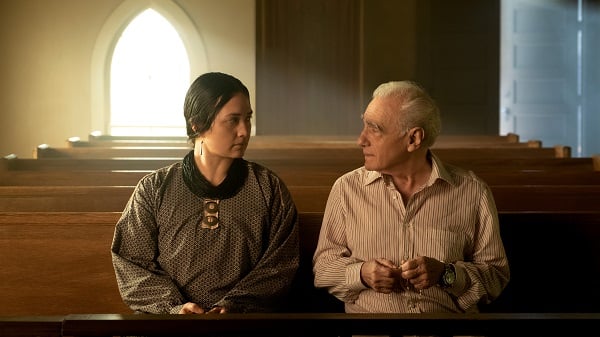Killers of the Flower Moon, co-written (with Eric Roth) and directed by Martin Scorsese, based on the book by David Grann, Killers of the Flower Moon: The Osage Murders and the Birth of the FBI
Oil has long been black gold, and the desire for it has warped nations, companies, and individuals. Those that have oil are prey for those who want it, even if it means acting in underhanded and illegal ways.
As There Will Be Blood character Daniel Plainview (Daniel Day-Lewis) -- ultimately inspired by real-life Southern California oil baron Edward L. Doheny -- says to a desperate failed investor, after Plainview has drilled sideways to drain oil deposits under the other man's land, "I drink your milkshake."
This sort of theft, greed and violence is on display in the latest epic -- truly epic, at nearly 3 1/2 hours (no intermissions allowed) -- from famed Catholic filmmaker Martin Scorsese, now in theaters. Apple Original Films produced Killers of the Flower Moon, with Paramount as the distributor. -- Editor's Note.
A Spiritual Dimension to a Tale of Theft and Murder
Have you ever laughed so hard, that you’ve cried? I truly hope you’ve experienced this doubling up of emotions before. It’s more commonly known as “tears of joy.”
If you haven’t, perhaps the mysteries of the Rosary can bring these emotions alive. Catholics pray the Joyful and Sorrowful Mysteries on different days of the week.
In some heightened events of our lives, both emotions take hold. Martin Scorsese’s new film Killers of the Flower Moon presents the reverse spiritual phenomenon: a proceeding of events so monotonously sorrowful, that you somehow find yourself partially chuckling near the end.
For any sports fans out there, if your favorite team had to absorb a wire-to-wire blowout loss at some point, you probably catch my drift.
What Is Killers of the Flower Moon About?
Scorsese’s adaptation stays close to Grann's nonfiction book. From the opening scene until the penultimate one, the director visits upon viewers an unrelenting sequence of Osage men and women turning up dead. This happens either through a gradual process of an unexplained sickness ravaging the tribe in Oklahoma, or violent sudden deaths via gunshot wounds.
The film, unlike the book, is not a “whodunit.” It’s readily apparent that rancher William King Hale (Robert De Niro) diverts every possible oil “tributary” from the Osage into his pockets. Nephew Ernest Burkhart (Leonardo DiCaprio) represents one revenue stream.
If Ernest can marry one of the Osage women, in this case, Mollie (Lily Gladstone), he and the eventual children will inherit the oil riches in the event of her untimely death. I was unconvinced by the screen chemistry of the two, and maybe that’s the point.
Mollie develops diabetes after adopting a Western diet. Ernest delivers the insulin shots, a few of which are laced with something poisonous. On one hand, he’s a loyal husband and father, but he also isn’t truly capable of love, given his diabolical actions.
A "Lily" to the Osage?
Native American actress Lily Gladstone truly steals the show. Scorsese depicts Mollie as one of the many practicing Catholic Osage in the film.
It’s through her faith that she and her tribe are able to endure an untold amount of misery and suffering. She reminded me of St. Kateri Tekakwitha, an Algonquin–Mohawk woman who took abuse from both white settlers and her own tribe.
Lily of the Mohawks is St. Kateri's esteemed title now. With Mollie and the Osage, the abuse seems to be one-sided, if both author and filmmakers are to be trusted. So, it appears Mollie is a “lily” to the Osage.
A scene late in the film shows Mollie embodying the rarest of emotions quite exquisitely: a half-laugh amidst the deepest of sorrows. It's the tiniest, subtlest moment of joy emerging from a film otherwise drowned in a deluge of tears.
*Lily Gladstone is a member of the Blackfeet Nation. Please tune into PBS in the month of November to watch Family Theater Productions’ Native Ball: Legacy of a Trailblazer. Native Ball tells the story of fellow Blackfeet Malia Kipp and her journey from the reservation to playing basketball at the University of Montana and into her professional life. Click here to learn how to watch.
Image: (L-R) Lily Gladstone, Martin Scorsese/Paramount
Click here to visit Father Vince Kuna’s IMDB page.
Keep up with Family Theater Productions on our website, Facebook, Twitter and YouTube.
